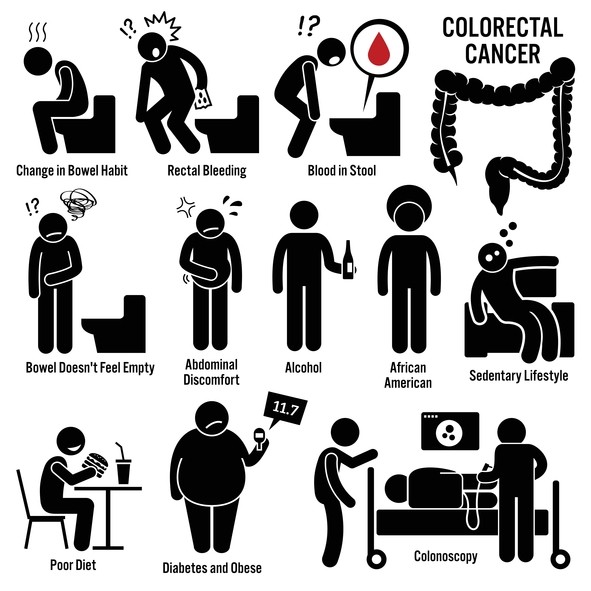Home » Colon Cancer » Page 2
Colon Cancer
 About Colon Cancer
About Colon Cancer
Colon cancer, colorectal cancer, is related to any cancer which starts in the intestine.
Often this cancer starts with a growth of a polyp in the intestine or the rectum. Locating and removing polyps may prevent the appearance of colon cancer and this is the reason for the importance of early detection.
The probability of developing colon cancer in the course of a person’s life lays currently at 1 of every 22 persons. This cancer is one of the three leaders of cancer mortality.
Colon tumors may be either malignant or benign. If it is malignant there is a chance that it may metastasize to other organs either adjacent or distant from the intestine and cause an injury to them.
Colon cancer starts when some cells which constitute the colon or rectum start growing and proliferating without control. This abnormal growth creates a tumor that is cancerous.
To improve patients’ chances, the American Society for Clinical Oncology, ASCO, that includes various specialists in its panel, such as oncologists, radiologists, gastrologists among others, guides oncologists to inform colon cancer patients in all topics related to clinical trials in every stage of their disease.
The National Cancer Institute, NCI, of the United States, stresses that for colon cancer patients, the preferred treatment option is to join one of the many clinical trials around the world and thus increase the chances of success over the standard protocols.
Symptoms of Colon Cancer
- Change in bowel habit
- Rectal bleeding
- Blood in stool
- Bowel doesn’t feel empty
- Abdominal pain and a feeling of swelling
- Alcohol consumption
- African American origin
- Sedentary lifestyle
- Poor diet
- Diabetes
- Obese

Colon Cancer Treatment Goals
The main objective of treatment is to slow down and control the disease’s progress and help reduce symptoms.
For metastatic stage 4 the primary objective is to prolong life and improve patient’s quality of life.
Standard Treatments
Treatment is determined in accordance with several factors, including size, location and staging of the disease, if it is a recurrence of the disease or not and the patient’s general condition.
Surgery to Remove Tumor Mass
The goal is to remove the tumor and the margins around it. The removed tumor mass will be examined under a microscope for identification of the cancer type and diagnosis.
At times, the patient may receive both, radiation therapy and chemotherapy with the intention to reduce the chances of the disease return.
Two main types of treatment may be offered to patients before and after surgery
- Treatment prior to surgery is known as ‘Neoadjuvant’
Usually this stage of treatment will involve chemotherapy and/or radiotherapy intended to reduce the tumor’s size and improve the success of surgery.
- Post-surgery treatment, also known as ‘Adjuvant’
This treatment seeks to cure and prevent the appearance of metastases or recurrence of the tumor.
Colon cancer, when metastasized is categorized as stage 4, is considered inoperable.
Radiotherapy
This involves use of radiation at higher levels of energy aims to kill the cancer cells remaining in the post-operative area.
Radiation may also cause decelerated growth of the localized tumor remaining in the area, or local recurrence.
In many cases, Neoadjuvant radiation will be used to shrink and reduce the tumor.
Chemotherapy
Chemotherapy is a medicated therapy which aims to shrink and erase cancerous cells and allow control over the disease.
Chemotherapy carries serious side effects, while its effectiveness is insufficient.
Chemotherapy’s impact has a range of side effects such as hair loss, loss of appetite, changes to bowel movements, fatigue, infection, hemorrhaging, incontinence, pain, and more.
Common chemotherapy treatments forcolon cancer include:
Ablation
A medical procedure also called burn, in which tissue is removed during surgery by chemoablation, cryoablation, photoablation or radiofrequency ablation (RFA).
Biological therapies
Anti – Angiogenesis
Cancer tumors survive and thrive in the body by causing the body to produce a system of blood vessels around them that nourishes them and provides them with oxygen.
Anti – angiogenesis agent is a biological antibody which harms the cancerous tumor capability to induce blood vessels growth around it from the environment where it is located, to nourish it so it continues to grow and proliferate. In this way the tumor is “starved” to death.
Examples of angiogenesis inhibitors
Immunotherapy
Immunotherapy drugs assist the immune system in attacking the tumor. This type of treatment is very different from chemotherapy, for example, which directly attacks the cancerous cells but unfortunately also damages healthy tissues.
The immune system has “immune barriers” which serve to regulate the immune system and prevent it from attacking the body. In cancer these functions are readily activated and as a result, the immune system ceases to attack cancerous cells, enabling the tumor to grow and proliferate in the body.
Barriers known as PD-L1, PD-1 and CTLA-4 are found on T-cells and cancer cells.
Immunotherapy is a revolutionary strategy, and one of the most widely studied worldwide for its application to numerous types of cancer and various stages of the disease’s development. Treatment is generally provided in the form of an intravenous infusion.
Examples of immunotherapy drugs for colon cancer
Advanced Cancer Drugs, Breakthrough Treatments and Clinical Trials from Around the World for Colon Cancer
Facts
- The existing therapies used on stage 4 metastatic cancer are not curative, and this is a source to the need for innovative and effective treatment strategies in order to fight the disease.
- The National Cancer Institute, NCI, highlights the fact that for a certain group of colona cancer patients, the best treatment option is to join one of the many clinical trials existing worldwide aiming to increase their chances of therapeutic success.
- Currently, every patient will be offered the standard protocols described above. Sometimes the oncologist may suggest integrating these therapies with trials carried out in the institute.
The opportunity
- Advances in cancer therapies may be found in clinical trials prescribing cutting edge, innovative drugs, some of which have already been recognized by the US Food & Drug Administration, the FDA, as “breakthrough drugs” and require further information to be approved.
- An entire world of clinical trials, Compassionate drugs and advanced new cancer treatments are available worldwide.
- It is important to know and have access to cutting edge cancer treatments that best match the unique medical condition of the patient and increase chances in winning the fight against compared to the standard care offered.
Note to remember!
Not every patient is eligible to enter a specific clinical trial. The eligibility conditions must be fully met and each case is reviewed separately to ensure that the clinical trial matches to the specific cancer patient and vice versa.
References
https://www.fda.gov/
https://www.ema.europa.eu/
https://www.health.gov.il/Pages/HomePage.aspx
https://www.medicalnewstoday.com/articles/155598.php
https://www.cancer.gov/types/colorectal
https://www.cancer.org/
https://www.cancerresearchuk.org/
Dear Reader,
This information is provided as a source of knowledge and does not constitute a medical consultation. For professional medical advice, see your attending physician. Information regarding drugs and commercial names belongs to the pharmaceutical companies.
To check if our service suits your case
We need to talk

Improve therapeutic outcomes, prolong life and quality of life, are our main business.
We support access to and expand cancer treatments beyond the standard of care, with the most advanced and innovative treatment options in the world, personally matching the individual cancer patient’s medical condition and with the support of top tier oncologists.
Article categories
קטגוריות המאמרים
Popular topics





